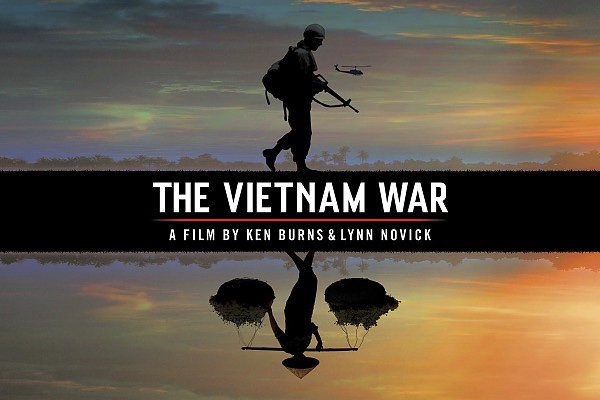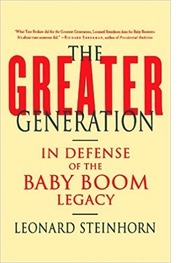Ken Burns's Gift to Conservatives

Related Link HNN’s Full Coverage of “The Vietnam War” by Ken Burns and Lynn Novick
Ken Burns may not imagine himself as a culture warrior aligned with the likes of George F. Will and the late Robert Bork, but woven into his epic documentary about the Vietnam War is a deeply conservative narrative about the 1960s and the youth movements that dominated the decade. Whether intentional or not, Burns and his co-director Lynn Novick have given cultural and religious conservatives an unexpected gift.
In their admirable effort to chronicle the heroism of our soldiers in Vietnam – a long overdue story that Burns and Novick tell well – they take a gratuitous swipe at the young people and college students who stayed stateside protesting not only the war but a society they increasingly saw as hypocritical, unequal, and unjust.
 In a telling moment in the film, Burns
and Novick segue from a punishing August 1969 firefight in Vietnam to the
festive throng of revelers gathered at Woodstock. "Two days
after the battle in which Tom Vallely distinguished himself," narrator
Peter Coyote says, "and while half a million Americans were still in
Vietnam, half a million Americans gathered on a dairy farm in upstate New York
for a music festival."
In a telling moment in the film, Burns
and Novick segue from a punishing August 1969 firefight in Vietnam to the
festive throng of revelers gathered at Woodstock. "Two days
after the battle in which Tom Vallely distinguished himself," narrator
Peter Coyote says, "and while half a million Americans were still in
Vietnam, half a million Americans gathered on a dairy farm in upstate New York
for a music festival."
Burns and Novick then intercut clips of Woodstock and Vietnam to the driving sounds of Santana’s "Soul Sacrifice." At Woodstock we see laughing, dancing, hugging, smug, and self-satisfied Aquarians; in Vietnam we see searing images of American soldiers crawling through mud, gasping for life, helping wounded buddies, and witnessing the fiery hell of Napalm.
While students and hippies partied at Woodstock, Burns and Novick imply, the real heroes of this generation were struggling to survive in Vietnam.
At another point, the sister of a soldier who lost his life in Vietnam contrasts her emerging opposition to the war with the party atmosphere among protesters. "I wasn't there to drink or smoke pot," she says amid images of young people quaffing from big jugs at a moratorium. "This was not a party." When portraying another peace march, the only sign Burns and Novick highlight says "Communist Party USA."
The message from Burns and Novick is effective and clear: baby boomers may celebrate Woodstock and peace marches as defining moments of their generation, but the real serious work of the Sixties was done by those whose lives and families were touched by battle in Vietnam. Frivolous pretenders, meet the true Sixties heroes.
It's long been a goal of conservatives to trivialize the 1960s youth and student movements, to portray them as emblematic of a pampered, spoiled, self-absorbed, and self-flattering generation that threw a tantrum in the Sixties and as a result upended the good and virtuous America of their roseate Fifties.
To Will, "the infantalism" of Sixties youth, characterized by their "impatience, hedonism, inability to defer gratification," was what "produced the cultural dissolution of the ‘60s.” Bork called for unmasking the Sixties because "opposition to the counterculture ... is precisely what our culture war is all about." One critic described women's liberation as "a rhetorical tantrum by its privileged practitioners."
These were not serious people, conservatives argue, and if the liberation movements of the Sixties were just a bunch of tantrums, why should we take the cultural changes that grew out of them seriously? Burns and Novick rather subtly vindicate this conservative message.
It may well be that Burns and Novick were so singularly driven to rectify the image of our Vietnam War soldiers – to portray them as the poignant, humble, and unsung heroes of a misguided war – that somehow they felt a need to elevate them at the expense of the youth movement and counterculture that were defining their generation's story at home.
But history need not be a zero sum game. Elevating one group does not require dragging down another. Burns and Novick could have told the compelling story of Vietnam warriors without subtly devaluing the youthful protesters and students who changed the course of American history that decade.
And change America they did. Burns and Novick may trivialize Woodstock, but the three-day event was in many ways an expression of a youth culture that was shaking up the sediments of American institutions and values.
Sixties youth sought to break open the smoke-filled room of double-standards, prejudiced attitudes, rigid hierarchies, restrictive sex roles, cultural conformity, government deceptions, and a morality that policed what we did in private but gave a wink and a nod to bigoted and discriminatory behavior.
In the decades since, no institution has been left untouched. Colleges and universities, which until the late-Sixties ignored minorities and women in favor of a canon dominated by white European men, now house gender, black, Latinx, Islamic and Jewish studies programs and do their best to reflect our diverse and complex world in their curriculum.
A decade before the Supreme Court ruled on gay marriage, half of all Fortune 500 companies provided same sex benefits, and the business community has led the fight against bathroom bills targeting transgender individuals. The military, once the embodiment of American masculinity, has balked at President Trump's order to ban transgender Americans from serving.
In 1972, only 300,000 high school girls played varsity sports, and many schools restricted their basketball games to half-court out of fear they would faint; today, more than 3.4 million girls play high school sports, and many go on to compete at college and in professional leagues.
It was Sixties youth who launched the modern environmental movement, and many credit the counterculture for resisting the old "Organization Man" corporate model and creating the impetus behind companies like Apple and our start-up culture today.
The changes spawned by Sixties youth are so pervasive that we often take them for granted today.
But to conservatives, many of these changes – particularly related to race, gender, and sexuality – upended a 1950s social order which they still cherish. Discrediting the agents of change, as Burns and Novick did, makes it easier for conservatives to discredit the change.
All of this is not to suggest that the Burns and Novick documentary is anything other than a powerful and methodical recounting of what happened in Vietnam and a penetrating explanation of why. But when caricature and editorializing masquerade as history – as with this cheap shot at Sixties youth – it needs to be called out.